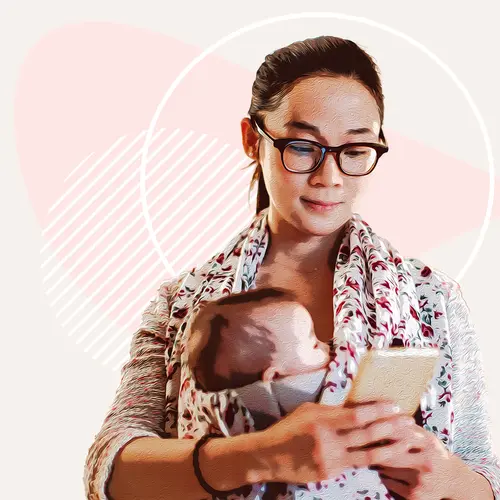New or first-time mothers have many questions about their bodies. One is whether they will have their period while breastfeeding. If you choose to breastfeed your child, it can delay your period after birth.
However, this is not always the case, as some mothers may have irregular periods. The hormone prolactin is responsible for preventing menstruation. When you breastfeed, the levels of this hormone are high in your body.
Because of this, you will probably not have your period or will experience only some light spotting while breastfeeding. Meanwhile, some women get their period a few weeks after giving birth, even if they are breastfeeding. Once you start weaning your baby off breast milk, you can expect to get your regular period back.
When Do You Get Your Period After Giving Birth?
The first period after the birth of your child can be as early as five to six weeks. Or, you may not have your period for as long as you nurse your child. Once you stop feeding your baby at night or begin to give them formula or solid foods, your period will return soon.
Your first period after you give birth may be heavier, and you may notice blood clots and have more cramping.
If you think you are losing too much blood or that there are clots, talk to your doctor.
Do Periods Affect Your Milk Supply?
Menstruation can affect your milk supply, especially during the end of the cycle or during your period. This is due to a decrease in prolactin concentration.
At this time, nursing may be uncomfortable, and you might see your baby nursing more frequently due to the decrease in blood supply.
Talk to your doctor about possible ways to increase your milk supply. Drink a lot of fluids and ask your doctor about taking magnesium or calcium supplements.
Can You Get Your Period While Breastfeeding?
Many women do not get their period until they start weaning the baby off breast milk. However, you could have your period a few weeks after giving birth. The timing differs from one mother to another. Irregular periods are also an aftereffect of pregnancy and breastfeeding.
Your period is most likely to resume if your baby no longer requires night-time feeding because they are sleeping for six or more hours. If your baby is feeding less or has started eating solid foods, your period will return soon.
Meanwhile, mothers who keep their babies close, carrying them in a carrier or a sling, are less likely to resume menstruation, as the baby can nurse any time they want.
Can You Breastfeed While You Have Your Period?
When you get your period, you may have sore nipples. Thus, breastfeeding on the first few days of your period may be uncomfortable. Here are some tips to minimize the discomfort:
- Try to breastfeed as often as possible, keeping the baby on your breast, as it would help maintain milk supply.
- Don't use numbing creams for pain relief. These creams can make your child's mouth numb and make the process uncomfortable for them.
- If you're experiencing too much discomfort, talk to your doctor about using an over-the-counter pain reliever.
- If nursing is too painful, pump breast milk. It will allow you to have enough milk supply for the time it takes for the tenderness to go away.
If you are breastfeeding while you are having a period, your baby might not want to latch on. That’s due to the change in the taste of breast milk. The chloride and sodium levels increase in milk during your period, and the lactose levels go down.
As a result, the milk is less sweet than usual. It is rather salty.
So, your baby may be fussy, feed less due to differences in taste, or refuse to nurse. Once your period is over, your baby will return to their nursing routine.
Will Breastfeeding Stop Me From Getting Pregnant?
Your period and breastfeeding routine could delay a new pregnancy. Some research shows that most women do not ovulate, or drop an egg for fertilization, for at least six weeks after giving birth.
This period can be longer if you are breastfeeding your child, because nursing works as natural birth control. But you should not solely rely on nursing if you do not want to get pregnant.


